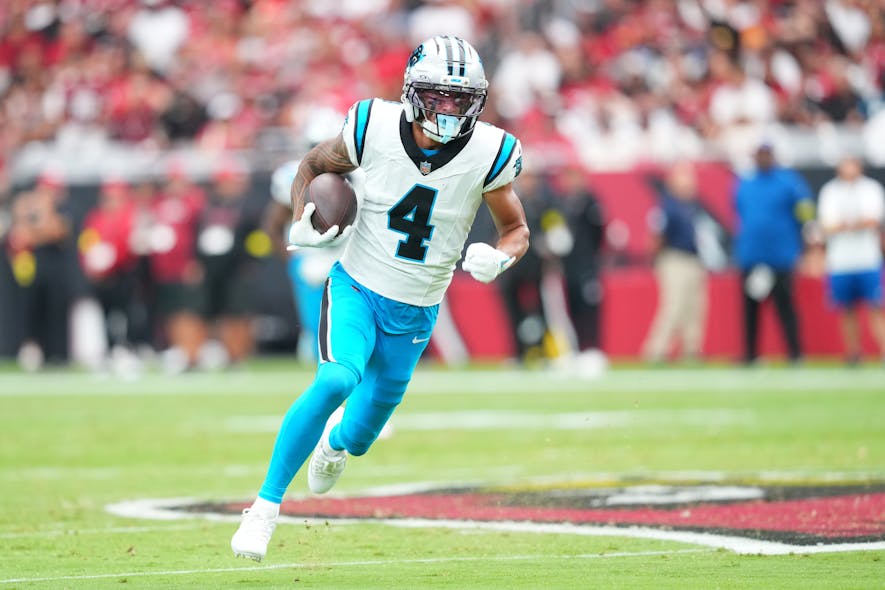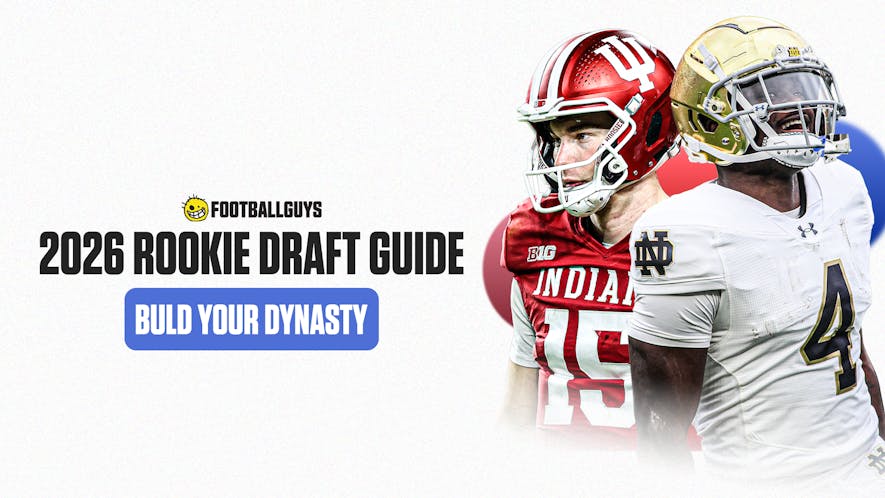Slate Overview
Smaller Slate, Bigger Decisions
With two Monday night games and an early Sunday kickoff in Dublin, the main slate shrinks to 11 games for the first time this season.
While this week's slate is smaller than usual, six games carry implied totals of 47.5 or higher, which means you won’t be forced into the ultra-narrow decision trees that define true short slates. But with fewer games to choose from, roster percentages will cluster more tightly around a handful of games and obvious value plays.
Higher ownership concentration means we need to be ultra-sensitive to gaining leverage when building lineups, even if it comes at the expense of a few extra projected points. The number of attractive games on this slate keeps us from needing to push all-in on short slate game theory, but in general, when fewer games cause highly concentrated roster percentages, you should consider over-stacking as a strategy.
Here are two ways to play it:
- Over-stack the popular games more aggressively than the field. This will land you on high-upside, unique rosters even if the chalk hits. As an example, let's say Bears at Raiders is the game that attracts the most ownership this week. Caleb Williams to Rome Odunze will be heavily stacked by the field a result. But fewer entrants are going to play Williams with three of his pass-catchers, plus more than one opposing Las Vegas player. If the game is predictably high-scoring, and you have all the fantasy-relevant players, you'll need fewer things to break right elsewhere. And with fewer games creating fewer paths to the top score, your opponents have fewer ways to beat you.
- Focus on less popular game environments. What if Bears at Raiders turns out to be an ugly game between two lousy teams? A game like Panthers at Patriots is only projected for three fewer points, but has plenty of players who can run hotter than expected. When the chalky spot fails and your over-stacked contrarian game breaks through, you're looking at maximum leverage. And once again, fewer things need to go right in the rest of your lineup for you to climb the standings.
Bottom line: Smaller slates favor the bold, even more than usual. Over-stacking in high-probability shootouts and lower-owned, secondary environments should be part of your GPP plan this week.
Top Game Environments
DFS is less about picking players in isolation and more about targeting the games where fantasy scoring can snowball. High totals, fast pace, and exploitable defenses all create environments where multiple players can go off together. Identifying these spots is the foundation for building winning GPP lineups.
Games in bold are lower-total games with the potential for higher-than-expected scoring. Stacking these games at a higher ownership level than the field will add leverage to your lineups if they exceed their implied totals.
- Saints @ Bills (-16.5) - O/U 48.5
- Colts @ Rams (-3.5) - O/U 49.5
- Jaguars @ 49ers (-3) - O/U 47.5
- Ravens (-3) @ Chiefs - O/U 48.5
- Bears (-1.5) @ Raiders - O/U 47.5
- Panthers @ Patriots (-5.5) - O/U 43.5
Identifying Common Roster Construction
Understanding what your opponents are most likely to do is just as important as spotting the best plays. Common roster builds form naturally when popular players are combined into a lineup. Recognizing the "chalky" construction helps us anticipate what the majority of rosters we're up against will look like, and allows us to decide the best ways to build differently for leverage without sacrificing ceiling.
QB: Quarterback spending by the field should be relatively light. Both Drake Maye ($5,500) and Caleb Williams ($5,800) stand out as underpriced relative to their respective season-to-date production and soft on-paper matchups. Josh Allen ($7,700) will be a somewhat popular tournament play with Buffalo implied to beat the Saints by 16.5 points and score over 32 points, but his salary doesn't fit common builds. Instead, those paying up will stop at Justin Herbert ($6,300), who is playing at an MVP-level against the porous NY Giants defense.
RB: This one is easy. The running back value plays all hit last week, making it even more enticing for the crowd to pile on Cam Skattebo ($5,500) and Omarion Hampton ($5,900), now that their platoon-mates are out with injuries. Christian McCaffrey's ($8,500) workload has returned to an elite level, but his salary hasn't quite caught up. He'll join Skattebo and Hampton in the flex spot of chalky builds.
WR: Puka Nacua ($7,600) is the first receiver our opponents will want to click on. His 79.5 total DraftKings points trail only Jonathan Taylor through three games, and with respect to Charvarius Ward, the Colts have no one who can slow him down. Spending on McCaffrey and Nacua in the same lineup will leave most entrants hunting for wide receivers in the $5K range. Depending on what they do at defense and tight end, they're likely picking two out of Chris Olave ($5,100), Keenan Allen ($5,300), and Jakobi Meyers ($5,400). More balanced variations of this construction may include Davante Adams ($6,200) instead of Nacua to bump Olave up to Rome Odunze ($6,300), especially when Williams is the quarterback.
TE: Brock Bowers is playing injured and coming off consecutive single-digit scoring weeks, and Trey McBride is not on the slate. Without a clear pay-up option, tight end spending will ordinarily land in the $4K range, where ownership should be fairly divided between Hunter Henry (especially in Maye lineups) and Tyler Warren ($4,600).
Flipping the Common Build: Lineups without at least one of Hampton or Skattebo will be exceedingly rare. The cleanest path to a contrarian roster is to create a lineup without either one. Skattebo, in particular, though, looks like good chalk, so you don't want to use that strategy in the majority of your lineups. High-priced quarterbacks are another obvious way to gain leverage using your salary allocation. While Allen might draw some attention in his matchup against the Saints, very few will pay up to Jalen Hurts or Lamar Jackson, each of whom can easily lead the slate in quarterback scoring.
Core Targets
Quarterback
Jaxson Dart ($4,500) - We don't know if Dart can score enough raw fantasy points to help you win a tournament in his first NFL start, but we do know his low salary allows you to roster more players who can. Dart isn't in play purely for cap savings, though. The Giants' play-calling leans pass-centric with a top-12 situation-neutral dropback rate. Justin Herbert and the Chargers are implied to score about 25 points and can easily cruise past that total against a New York defense that struggles to contain receivers after the catch. In all likelihood, Dart will be throwing more than people expect, and he can pad his fantasy numbers with rushing stats, as we saw during the preseason (52 yards and one touchdown on six carries). Malik Nabers ($7,00) will have single-digit ownership, giving Dart a contrarian stacking partner with slate-breaking upside. And adding Skattebo to the stack creates a unique way to benefit from an otherwise chalky player if he has a big game as a pass-catcher.
Jared Goff ($6,400) – No one seems to be paying the Lions any mind, even though they're double-digit favorites at home, and are implied to score over 27 points. Cleveland's defense has stifled opponents. The Browns are allowing a league-low 204.3 total yards per game, including just 57.3 rushing yards. If the Lions can't run on Cleveland, there is only one other way they can reach their implied total. Goff is notorious for playing better at home since joining the Lions. He has an 81:18 touchdown-to-interception rate in 35 home starts for Detroit vs. 41:22 in 33 games on the road. With all respect due to the Browns' defense, their play is bound to regress, and we've already seen Lamar Jackson carve them up through the air in Week 2 (225-4-0 on 29 attempts). Stacking Goff with Amon-Ra St. Brown allows you to play chalky with the rest of your lineup.
Additional Targets
- Drake Maye ($5,500) - The preseason thesis on Maye as a strong fantasy asset is playing out. He's got a live arm, and his 9.2% scramble rate trails only Patrick Mahomes II for the league lead. Carolina's 30-0 win last week had more to do with Michael Penix Jr. and the Falcons' offense than anything we need to fear about the Panthers' defense.
- Josh Allen ($7,700) - There is a chance Allen will have to compile all of his stats in the first three quarters of a blowout win, and a chance Buffalo's scoring continues to run through James Cook. But there's also a chance Allen lights up the Saints for a score you need to have in tournaments, and that chance is greater than his ~6% roster percentage.
- Justin Herbert ($6,300) - The Chargers' pass-catching weapons present matchup nightmares for the Giants' defense. A passing line similar to Week 1 (318-3-0) is in play for Herbert, which would likely come at the expense of a chalky Hampton's fantasy output.
- Trevor Lawrence ($5,200) - There is nothing about Lawrence's season-to-date performance that points to him righting the ship in San Francisco. His -10.8% completion rate over expected ranks dead last among 31 qualifiers. The Jaguars at 49ers, however, has a 47.5-point implied total, and the only player from the game with significant ownership is McCaffrey. If this game plays to a shootout game script, and one or more of the popular games fail to produce, your Jaguars stacks (with McCaffrey as a run-back) will vault up the standings.


